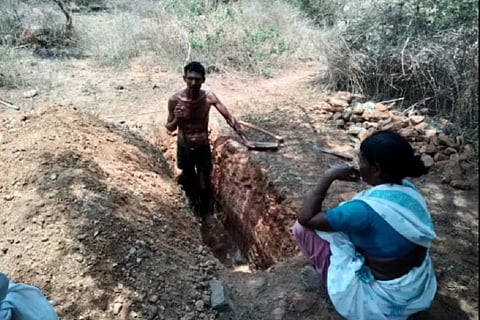

A panchayat chief from Tiruvannamalai district, who belongs to the Irular community, has alleged discrimination by dominant caste members of the village council. He has alleged that the members treat him like a ‘bonded labourer’, while they call the shots on any work to be done in villages under their control.
60-year-old Murugesan, who took up the post after winning elections in December, had alleged that he was paid to dig a grave for a deceased dominant caste member on Monday.
The Chengam taluk in Tiruvannamalai is a reserved constituency and this, according to Muruguesan, led to the dominant communities — Vanniyars and Reddiyars — choosing a member of the Scheduled Tribe community to contest local body polls. But as soon as he won, he was allegedly sidelined while other members took over the post. The discriminatory treatment meted out to the panchayat chief came to light after pictures surfaced of him allegedly being forced to dig a grave.
“I am the panchayat chief but another panchayat member named Selvam from the Vanniyar community is the one who controls everything,” says Murugesan. “They simply use me to get documents signed. Even my selection for the post was decided by the other communities and I was just informed. I make no decisions for the panchayat and have no say in what is happening here. I am not able to do anything for my community at all,” he laments.
Despite being the panchayat President, Murugesan works as a daily-wage labourer and is struggling to meet his everyday expenses.
When asked about being forced to dig a grave on Monday, Murugesan initially stated that he had gone to pay his respects to a deceased person, when villagers instructed him to carry out the burial work.
“They are treating me like a bonded labourer,” he alleged, in an interview to the local media.
“I went to garland a deceased person and they (members of the dominant community) threw away the flowers and told me I am only fit for digging the grave. It is true that I dug the grave,” he admitted.
However, when TNM contacted him on Thursday, he claimed that he was paid Rs 1,000 for the work and had done it willingly.
While his contradictory statements have raised doubts about the incident, I Pandiyan, from Witness, an anti-discrimination NGO says, “We know how vulnerable he is and how such victims can turn hostile. Compelling a member of the Scheduled Caste or Scheduled Tribe to dispose or carry human or animal carcasses or to dig graves is punishable under section 3(1)(i) of the Scheduled Caste and Scheduled Tribe (Prevention of Atrocities) Act. Even if Murugesan is not ready to fight that particular battle, there is still the fact that he is not being allowed to discharge his duty.”
According to Section 3(1)(m) of the Act, anyone who forces, intimidates or obstructs a member of a Scheduled Caste or Scheduled Tribe, who is a member or a chairperson or a holder of any other office of a Panchayat under Part IX of the constitution or a municipality from performing normal duties and functions can be punished for their actions.
“What’s more, the Collector and Superintendent of Police can take cognisance of this and act. They don't need to wait for a complaint,” points out Pandiyan. “Section 8 of the Prevention of Atrocities against SC/ST Act says that when an accused carries out an action while being aware of the victim's social background, it falls under the purview of the act,” adds.
Speaking to TNM, Tiruvannamalai Collector KS Kandasamy, confirmed that enquiry had been conducted into the allegations but had not led to any action yet.
"During the enquiry, Murugesan said that the Vice President who belongs to the Reddiyar community had given him Rs.2000 and asked him to employ someone to dig the grave. However Murugesan believed that his own family could use this money and decided to do it himself," says the Collector. "When the enquiry committee spoke to the Irula community there, they said they have been digging graves and that there was no compulsion from the other side," he adds.
What the Collector however fails to note is that the digging of graves has been traditionally handed over to members of oppressed communities, and is considered a norm despite its discriminatory nature.
Further when asked about allegations that Murugesan was not allowed to perform his duty, the Collector says, "He did not reveal this in the enquiry. An official enquiry is different but reality maybe different. Upper class domination, as we know, does exist. Not just this panchayat, there will be thousands of cases like this. If it is proven we can file a case."